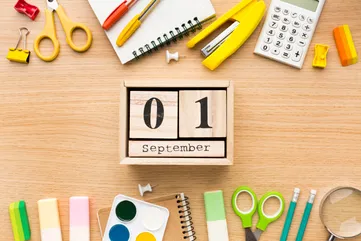Digital Organization Tools
Digital organization tools are apps, software, and online systems that help teens manage schedules, assignments, notes, and tasks through technology rather than paper-based systems.
Why digital natives need digital systems
Research shows that digital organization tools can improve executive function, particularly for students with ADHD or learning differences. The external structure, automatic reminders, and visual interfaces compensate for working memory and attention challenges.
Studies of student organization methods reveal that consistency matters more than medium. Students who consistently use digital tools show better assignment completion rates than those who inconsistently use paper planners. The accessibility and integration of digital tools with existing teen technology use patterns increases adherence.
Xu et al. (2019) found that students using digital organization tools showed 30% improvement in assignment completion rates. Mangen and Velay (2010) demonstrated that while handwriting has benefits, digital tools provide superior organization and retrieval capabilities for many students.
You're not alone
If your teen's expensive planner sits unused while they rely on phone reminders, or they lose paper assignments but never misplace digital files, digital organization might be the answer. Many parents resist screen-based organization, fearing more device dependence. However, meeting teens where they are often works better than forcing analog systems. Families embracing digital organization often see improved assignment completion and reduced morning chaos.
What it looks like day to day
Student
Your teen gets phone notifications about upcoming assignments, checks their digital calendar for practice times, and shares Google Docs with study partners.
Parent
You can view your teen's shared calendar to coordinate transportation without constant texting about schedule changes.
Tiny steps to try
Implement digital organization gradually with appropriate tools.
- 1
Start with calendars
Use Google Calendar or similar for all commitments. [Color-code by category](/the-parent-bit/finding-order-in-the-chaos-setting-up-calendars-for-kids). Set reminders for everything initially.
- 2
Task management apps
Try Todoist, Notion, or even simple reminder apps. Start basic before adding complex features.
- 3
Note consolidation
Use OneNote, Google Keep, or Apple Notes to centralize information. Searchable notes beat lost papers.
- 4
Photo backup
Photograph paper handouts immediately. Create folders in photo apps for easy retrieval.
- 5
Gradual adoption
Master one tool before adding another. Overwhelming with too many apps defeats the purpose.
Why digital tools work for many teens
Digital natives often respond better to tech-based organization than traditional planners, plus digital tools offer features impossible with paper systems.
Benefits of digital organization:
• Automatic reminders and notifications
• Synchronization across all devices
• Search functionality for finding information
• Collaboration features for group projects
• Cloud backup preventing lost work
• Integration with school platforms
The key is finding tools that match your teen's needs and actually get used.
References
Mangen, A., & Velay, J. L. (2010). Digitizing literacy: Reflections on the haptics of writing. Advances in Haptics, 385-401.
Xu, S., Wang, Z., & David, P. (2019). Mobile app adoption in education: A systematic review. Mobile Information Systems, 2019.
Ready to help your teen thrive?
Get personalized 1-on-1 coaching to build better habits and boost grades. Join 10,000+ families who trust Coachbit.
Frequently Asked Questions
Won't digital tools increase screen time and distraction?
Organization apps typically require brief interactions, unlike social media or games. Set up tools on parent devices initially if concerned about distraction. Use website blockers during homework if needed. The organization benefits usually outweigh minimal screen time increases. Focus on functional use versus recreational screen time.
What if school requires paper planners?
Many schools accept digital alternatives or allow both. Photograph paper planner pages as backup. Some teens need to minimally complete school-required paper planners while actually using digital systems. Advocate for digital accommodations if paper systems consistently fail. Schools increasingly recognize that function matters more than format.
Related Terms
Assistive Technology
Assistive technology includes any tools, devices, or software that help students with learning differences or disabilities access education and complete tasks more independently and effectively.
Organization
Organization is the ability to create and maintain systems for managing materials, information, and time in ways that support efficiency and goal achievement.
Time Management
Time management is the ability to plan, prioritize, and use time effectively to accomplish tasks and meet deadlines without constant crisis.
Related Articles

Finding Order in the Chaos – Setting up Calendars for Kids
Creating a calendar and daily schedule for kids can be beneficial to manage school, homework, extracurriculars and hobbies. Color-coding and time-blocking are helpful tools for kids with ADHD.
Read article
3 Ways an Executive Functioning Coach Can Help Your Child
Discover why executive functioning skills are crucial for your child's success. Learn how an executive functioning coach can make a difference
Read article
The 6 Best Study Skills for ADHD Teens
Learn the 6 best study skills for ADHD teens to boost their academic success. Prioritization, note-taking, dedicated study space, brain breaks, and multi-sensory learning. Find out how an ADHD coach can help!
Read article
